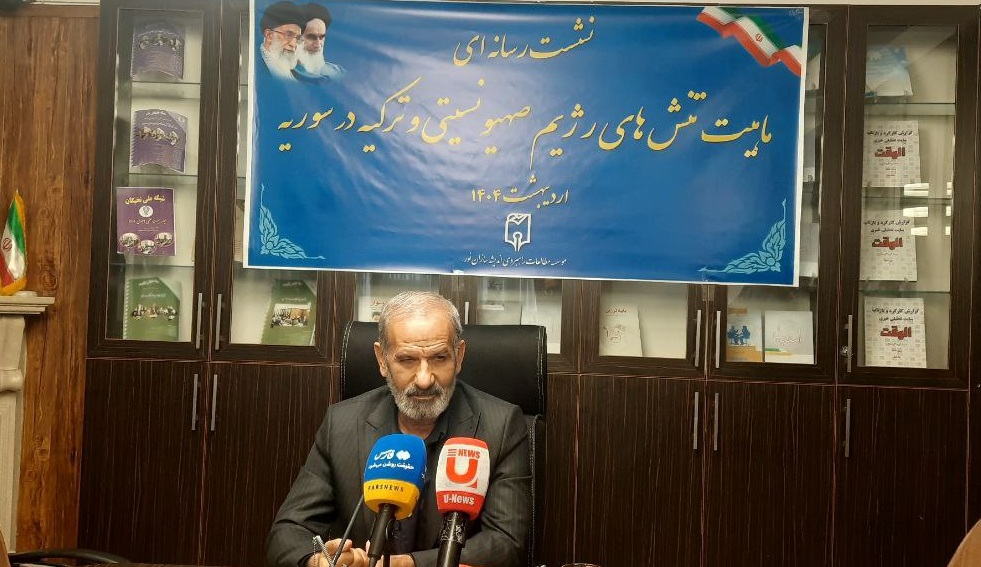Alwaght- Andishe Sazan-e-Nour Institute for Strategic Studies held a media meeting on Wednesday titled "the nature of the Israeli-Turkish tensions" in Syria. In the meeting, West Asia affairs expert Saadullah Zaree gave a picture of Syria situation and brought in spotlight the tensions between Israel and Turkey in this Arab country. This report highlights the most important parts of this meeting
Israeli attacks stepped up after al-Assad fall
Mr Zaree commented on heightening of the Israeli aggression on Syria, saying that after fall of government of Bashar al-Assad in December, Tel Aviv crossed all the red lines and struck across Syria. This raises a question: Why has Israel increased its attacks on Syria while the resistance forces lost their positions in this country? In this relation, we should consider the developments in Syria. Israeli regime has concerns over Syria from two aspects: First, re-rise of resistance which is likely given the Syrian people's spirit and the Israeli aggression on the country. In fact, Israeli aggression has institutionalized the spirit of resistance among Syrians, and Israel is always concerned about the establishment of a government with a pro-resistance approach. Therefore, the Israelis destroyed all of Syria's infrastructure so that if a government close to and aligned with the resistance is established anew, there would be no military infrastructure in Syria for the resistance to regain strength.
The second Israeli concern, Mr Zaree added, is the affiliation of the new rulers of Damascus to the Muslim Brotherhood. Actually, Israel believes that rise of Muslim Brotherhood (MB) in Syria will provoke and activate other MB movements in the region. The Israelis believe that the establishment of a MB-affiliated government in Damascus is a threat to Tel Aviv's horizon in Syria, as the Islamist movement is inherently opposed to Israel. Also, occupying and deploying forces in the Golan Heights is another goal of Israel in its attacks on Syria.
500 attacks in 5 months
Mr Zaree added: In a 5-month period, Israel launched nearly 500 attacks heavily targeting various Syrian positions. In the meantime, the Turkish government as the sponsor of new rulers in Syria has avoided tension and confrontation with Israel in order to reach a specific principle with it, and at several stages, Turkish Foreign Minister Hakan Fidan has emphasized that he is not seeking tension with Israel in Syria and said that he can provide the necessary guarantees that Israel will not be threatened from Syrian soil. On the other hand, a political path has also been opened through Azerbaijan, and in recent days, negotiations have been held between the Turkish and Israeli security services in Baku. As a continuation of these negotiations, the Israeli Prime Minister Benjamin Netanyahu and the Azerbaijani President Ilham Aliyev were supposed to meet in Baku. This meeting was supposed to be held on Wednesday, but due to the increase in tensions between Turkey and Israel, it was postponed, but a specific date has not yet been announced for this meeting.
Israel-Turkey sustained tensions in Syria
Mr Zaree believes that the tensions between the two sides actually do not end with political agreements since the Israelis think that any political agreement can collapse with change of government. So, it is unlikely that Erdogan government's strategy for cooperation with Israel in Syria will go anywhere because Israel insists on gaining its aims in Syria using military force. Therefore, tensions will continue and Israel's insistence on continuing occupation in Syria will continue. Even the mediation of some sides, such as the US, cannot end these tensions in Syria. Trump pushed to end these tensions during Netanyahu's visit to Washington, but he failed.
Failed Turkish effort
Mr Zaree further held that Turkey is taking steps to get things under its control in Syria, but the Arab League is uninterested to reach a conclusion with the Turks over Syria. Actually, for the Arabs, Turkish influence and presence in Syria is as unacceptable as the Israeli presence in this Arab country. Therefore, Turkey will have to take action alone in Syria. Turkey will not be passive in Syria, but at the same time, we will not see Turkey defending Syria, and meanwhile, the Israelis will continue their attacks.
Solution for Syria
The Iranian expert held that the solution for the current standoff in Syria is internal. There should be a settlement from within Syria since Damascus cannot protect its security relying on verbal assurances of Erdogan of the Arab League. Syria must strengthen its defense and equipment capabilities. If Syria becomes capable of action, Israel will not be able to do anything there, just as Israel's hands are tied in areas where the resistance is active in Syria.
Turkish and Israeli aims in Syria
Commenting on the aims of Israel and Turkey in Syria, Mr Zaree maintained that Turkey is seeking to create an MB axis aligned to Ankara. On the other hand, Israel has a different plan in Syria. Israel seeks a tumultuous Syria hit by sectarian disputes and a weak central government lacking any will against Tel Aviv. Israel's strategy in Syria centers on the creation of fragmented and disunited sectarian Alawite, Druze, and Kurdish, and Sunni regions to prevent formation of a strong central government. This is Israeli ideal for not just Syria but the whole region to bury the possibility of rise of any resistance against Israeli occupation in the region.



























